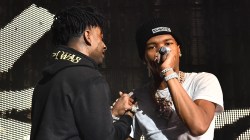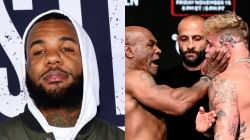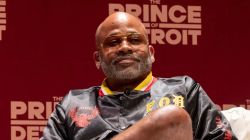From old school to new school Hip Hop’s beloved Jungle Brothers have been through it all. Group member Mike G was kind enough to chat with us on everything from his introduction to Hip Hop to music industry label politics.
You’ve done a lot of work with dance music as well as Hip Hop, how has this style come about in your music?
It’s always been a part of our repertoire and a part of our taste. The house, dance music had a great influence on Hip Hop. We recorded “Girl Of House;” and at the time we were heavily into house music and that pretty much just stuck with us. Dance music has always been there. You know, it even branches out from disco, so it’s something that’s naturally there.
How has it come about that you’ve had jungle remixes done on some of your songs?

AD LOADING...
Mostly, just trying to reach out to the different audiences out there. The label has really put us in touch with the jungle community that had a liking of our early Hip Hop stuff. You send your acapellas out there to get remixed. Some producers do jungle tracks, while some drop more dance tracks. The Urban Takeover mix is probably the most popular one that has stuck so far. But we’ve had great mixes by Natural Born Chillers. You guys have done a lot of work with the Propellerheads, such as on V.I.P. Exactly, they produced the whole V.I.P. album, Alex Gifford from Propellerheads. We were getting a lot of feedback from the Urban Takeover mix, and from tracks like “Girl Of House,” or “Whatchu Waiting For” where the dance audience was really giving us a lot of love. And its funny to see how some people think the audiences don’t mix. But the same audiences that listen to Hip Hop, to Jungle Brothers, to De La, to Tribe they also listen to Fatboy Slim, Propellerheads, Tricky all these guys. And we just garnered up a great relationship with Alex, and we asked him if he wanted to be involved with our record and he was totally with it, and we just took it from there.
You were with the Backstreet Boys and did a tour, what’s up with that?
They gave us a call. They needed somebody to open up for them, our album was about to drop. The idea of releasing an album is to get in front of anybody, and everybody. That’s what its about man, you can’t really bias to who you perform in front of, who you want to hear your music. You make music for the masses to hear and enjoy. So whether the person who likes your music likes Backstreet Boys, MC Hammer, or likes whoever that doesn’t mean that you have to not let them hear you. They gave us the opportunity and we did what we had to do. We came out of there with a lot of fans every night, and we shocked everybody. We definitely let everybody know we are Hip Hop, we are the Jungle Brothers and this is what its about.
On the subject of making music for the masses did you find differences between the audiences in Europe where you’ve gotten a lot of publicity lately, and those in North America?

AD LOADING...
We were able to build a stronger fan base throughout Europe because of our earlier days. But as of now, we’ve been doing a lot of raves all throughout the country. And the audience is kind of pretty much the same reception. They have the same idea about the music, the same love for the music. Its more experimental, and more really soul driven. A guy like Jay-Z definitely wouldn’t go but so far, like he’s a commercial actor over there. Commercial acts come and go. We built a fanbase for being true, spiritual artists who keep one foot definitely within the music and one foot definitely on our identity of who we are.
Has it been hard to stay true to your creative selves during these ten years in which rap has become more commercialized?
Not really, not at all. Because we are who we are, we try not to put too much of a fa



